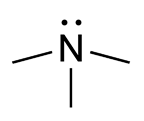Fish odor syndrome
| Trimethylaminuria | |
|---|---|
 |
|
| Trimethylamine | |
| Classification and external resources | |
| Specialty | endocrinology |
| ICD-10 | E88.8 |
| ICD-9-CM | 270.8 |
| OMIM | 602079 |
| DiseasesDB | 4835 |
| GeneReviews | |
Trimethylaminuria (TMAU; primary trimethylaminuria), also known as fish odor syndrome or fish malodor syndrome, is a rare metabolic disorder that causes a defect in the normal production of an enzyme named flavin-containing monooxygenase 3 (FMO3). When FMO3 is not working correctly or if not enough enzyme is produced, the body loses the ability to properly convert trimethylamine (TMA) from precursor compounds in food digestion into trimethylamine oxide (TMAO), through a process called N-oxidation. Trimethylamine then builds up and is released in the person's sweat, urine, and breath, giving off a strong fishy odor or strong body odor. A variant of TMAU (secondary trimethylaminuria or TMAU2) exists where there is no genetic cause, yet excessive TMA is secreted, possibly due to intestinal dysbiosis, altered metabolism, or hormonal causes.
Trimethylamine builds up in the bodies of patients with trimethylaminuria. The trimethylamine is released in the person's sweat, urine, reproductive fluids, and breath, giving off a strong fishy or body odor. Some people with trimethylaminuria have a strong odor all the time, but most have a moderate smell that varies in intensity over time. Individuals with this condition do not have any physical symptoms, and they typically appear healthy.
The condition seems to be more common in women than men, for unknown reasons. Scientists suspect that such female sex hormones as progesterone and estrogen aggravate the condition. According to several reports, the condition worsens around puberty. In women, symptoms may worsen just before and during menstrual periods, after taking oral contraceptives, and around menopause.
The odor seems to vary depending on many known factors, including diet, hormonal changes, stress level, amount of sweat, other odors in the space, and the observer's sense of smell.
Most cases of trimethylaminuria appear to be inherited in an autosomal recessive pattern, which means two copies of the gene in each cell are altered. The parents of an individual with an autosomal recessive disorder are both carriers of one copy of the altered gene. Carriers may have mild symptoms of trimethylaminuria or experience temporary episodes of fish-like body odor.
...
Wikipedia
